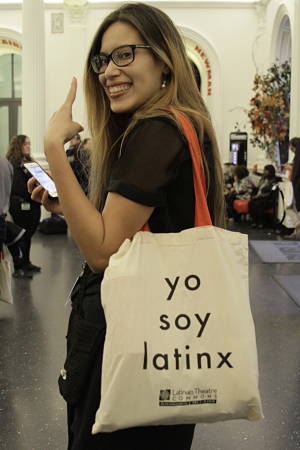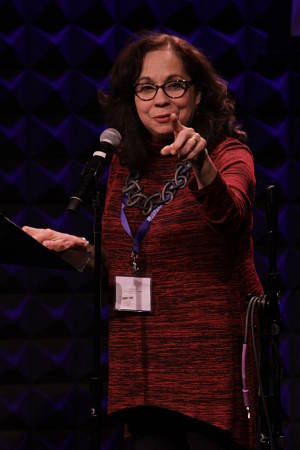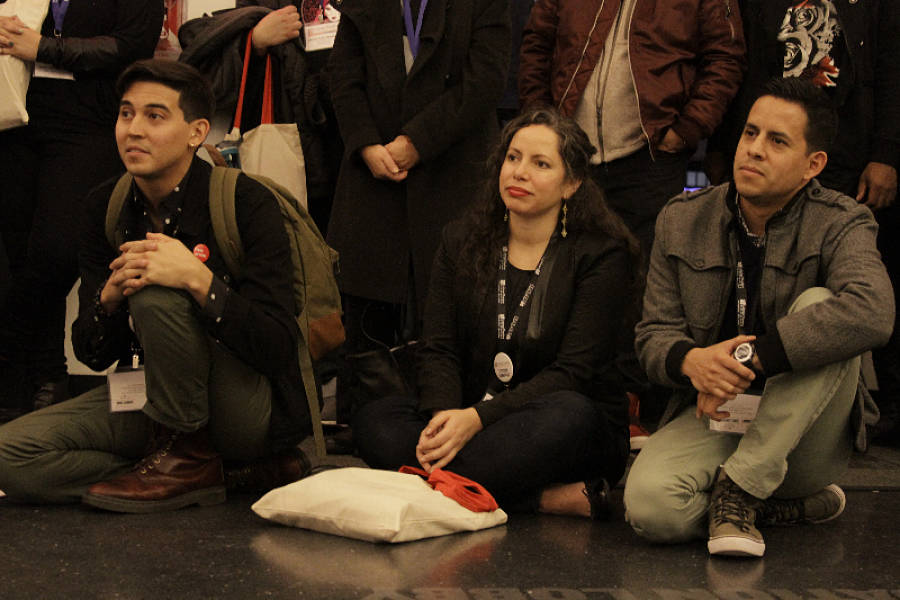NEW YORK CITY: Theatremakers from Texas to Chicago, Juárez to New Jersey, Canada to Philadelphia filled the space at the Flamboyán Theatre at the Clemente Soto Vélez Cultural and Educational Center in Manhattan’s Lower East Side. We constructed life-sized puppets, created the sea with our bodies, parodied talk shows, transformed our arms into weapons and back into human arms, climbed into an ice bucket in solidarity with the water defenders at Standing Rock. Making some of the first new theatre after the U.S. presidential election, we staged plays about the future commissioned from a range of New York playwrights, including Vicki Grise, Kyoung Park, Christina Quintana, and Caridad Svich. The plays dealt with prospects for Cuba, women’s reproductive rights, indigenous peoples’ land rights, Black Lives Matter, the LGBTQ community, Puerto Rico, detention centers, and more. As Grise eloquently declared, we have to try the impossible—the possible has been tried and it doesn’t work.
And this was just the first hour of the second day of the Latina/o Theatre Commons (LTC) Convening, the first ever held in New York City, Dec. 1-4.
After three years of creating a historically impactful national movement, the LTC took on many firsts in NYC: holding creative workshops, moving among nine venues, splitting into three distinct tracks (leadership, aesthetics, and identity), and just handling New York itself. LTC producer Abigail Vega noted that it was also the first of the LTC convenings to be sold out in less than 24 hours. “This has never happened to us before,” Vega marvelled.

The LTC, in collaboration with Howlround, a knowledge commons by and for the theatre community housed at Emerson College, has as its mission to transform the narrative of the American theatre, amplify the visibility of Latinx performance-making, and champion equity through advocacy, art-making, scholarship, and convening. Initially conceived by playwright Karen Zacarías in May 2012 at Arena Stage in Washington, D.C., the LTC has been holding vital gatherings and festivals in Los Angeles, Chicago, Boston, Dallas, and Seattle.
Here in New York, our community is feeling the full force of being targeted in the dawning age of Trump: as LGBTQ people, women, Spanish speakers, members of immigrant families, undocumented, and Latinx. Micha Espinosa, an artist/activist and associate professor of Voice and Acting at Arizona State University, put the question this way: “How are we going to manage and respond to the trauma?”
We began by gathering in a circle in the Public Theater lobby. Playwright Migdalia Cruz took the microphone and said, “It has to be from here, right here, this instance, my cry into the world.” Director Daniel Jáquez continued in Spanish: “Tiene que partir de aqui/en este mismo instante/mi grito al mundo.” They were quoting iconic Puerto Rican poet Julia de Burgos. Migdalia then invoked her great grandfather, who was freed from slavery in Puerto Rico in 1873. He taught her the power of ritual, prayer, and protection, she says: “Our people have been hunted, persecuted. And sold.” She reminded us that it takes more than holding hands to be a community, and asked us to keep our wounds open and honest—to look at each other as “who we really are, not who we want to be,” to challenge each other to be better, to be courageous.
All 160 convening participants said our names, where we were from, collectively remembered our ancestors and how they brought us to this moment, and dedicated our work over the next four days to something or someone we hold most dear. The Universes ensemble (Steven Sapp, Mildred Ruiz-Sapp, and William Ruiz, a.k.a. Ninja) broke into song. We chanted and flowed into Joe’s Pub, where we received rousing welcoming speeches by the “champions” (the planning team) in New York: Rebecca Martinez, Jacob Padrón, and David Mendizábal. Our keynote speakers filled us with inspiration. “Not waiting” became a necessary dicho (saying or teaching.) Rosalba Rolón of Pregones Theatre reminded us of the power of convenings, from the 1970s to now, as national “revelation,” but it’s work we have to do, as “no one will do it for us.”
Stephanie Ybarra of the Public urged us to remember that theatre artists “have the power to ability to unearth, and reveal forgotten and untold stories of our past… to correct false or reductive narratives that feed the worst parts of humanity,” and that we have the power to “conjure our future.” Then the all-women band Mariachi Flor de Toloache took the stage, and we danced.
On days 2 and 3, we fanned out across the city—for performances, cafecitos, or deep conversations, having the effect of making this convening highly subjective, unique for each of us. On Friday, we broke into our three tracks (leadership, identity, and aesthetics), and on Saturday, we broke into another three tracks at the legendary Latinx theatres in New York (the “Holy Trinity”): INTAR, Repertorio Español, and the Puerto Rican Travelling Theatre. We were encouraged to seek out participants in other tracks to learn about their experiences.
I’d been staging plays and exploring “What is a Latinx play?” on the “aesthetics” track. Meanwhile, Meggan Gomez, an actor and theater conservatory director at Working Classroom in Albuquerque, told me about the “leadership” track, where they created powerful mission statements on being “change agents.” One key takeaway: To be a change agent you must also be willing to change. Cynthia DeCure, an actress/playwright and assistant professor of theatre at California State University at Stanislaus, attended the “identity” track. She recounts how, after exploring an identity spectrum, the work of that group was given great depth by the introduction of objects and songs representative of those identities. This track included leaders from black, Jewish and Asian-American theatre communities to explore perspectives from outside the LTC. Some of these leaders said they found the LTC enviable for its momentum, size, and scope.

We also came together for two town halls. Emilya Cachapero, Theatre Communications Group’s director of artistic programs, introduced and screened the Míriam Colón segment of the new TCG Legacy Leaders of Color Video Project (LLCVP). A panel featuring Quiara Alegría Hudes, Emilio Sosa, Rosalba Rolón, and Carlos Ibarra explored ideas of going “Beyond Success: On Impact and Paying It Forward.” On Saturday night we had a Sábado Gigante, a huge party complete with dancing to a great salsa band and standup comedy, Ballet Folklórico, performance poetry, duets, and drag. Anthropologist/folklorist Maribel Álvarez urged us to embrace nuance and complexity in the wake of the election, given that just 66 percent of Latinx people voted for Hillary Clinton, in comparison to 88 percent of the African-American vote. Similary, 68 percent of Latinx people are against building a wall on the border with Mexico, while 82 percent of African Americans are against it. The Latinx community is divided across lines of color, class, sexuality, race, language, and immigration status.
On our final day, Oskar Eustis gave one of his first public talks since the election, stating passionately that Latinx voices are needed more than ever, as we are currently fighting about who our country belongs to; if we do not make space for all of our voices, then it is “pick your tragedy.” Princeton scholar Brian Herrera pointed out that our commons-based approach builds solidarity and conjures possibility, even in New York, a center of what he called “proprietary structures of privilege.” Karen Zacarías, our founder, invoked the power of being together, face to face, in a room, celebrating that we can hear so many more stories than we could three years ago.
Younger artists gave awards to legendary leaders in our field, honoring their visionary strength, making our history visible. We closed with another ritual, reading out commitments we will take into the future. It was hard to leave our circle and go back to the streets. How can we take all the power, love, and joy of this convening back to what we now face?
Then I remember Migdalia Cruz and Daniel Jáquez reading de Burgos at our inception: “It has to be from here, right here, this instance,” our cry into the world, nuestro grito al mundo.
Elaine Ávila is a U.S./Canadian playwright of Portuguese descent and an artist in residence at Quest University Canada.


